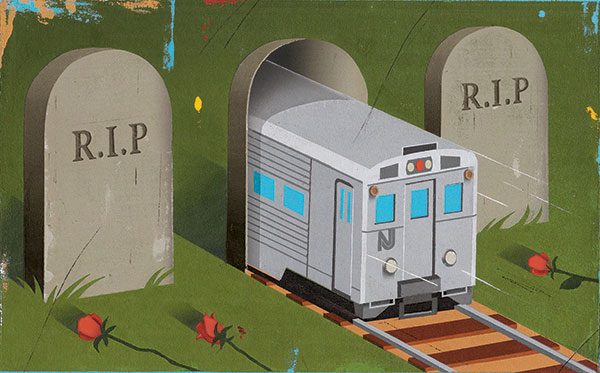
At just 2.7 miles, the route of the Dinky—a New Jersey Transit shuttle train connecting Princeton University to the nearby Princeton Junction station—might be the shortest regularly scheduled rail line in the country, but there’s nothing small about the uproar over the beloved train’s proposed demise. For almost 145 years, the Dinky has whisked countless commuters, including some of the world’s greatest minds, from the university to the Junction, where a much larger station sits on the heavily trafficked Northeast Corridor shared by Amtrak and New Jersey Transit. Albert Einstein rode the Dinky; so did Woodrow Wilson. In This Side of Paradise, F. Scott Fitzgerald described waves of Princeton freshmen arriving at school by Dinky. The Dinky even carried the Liberty Bell in 1903.
Despite its rich history, though, the Dinky’s days may be numbered. This year, New Jersey Transit scaled back daily service and proposed paving the line over and replacing the two-car train with ultra-modern buses. A hearing on the plan is scheduled for September 30 before the Princeton Borough Planning Board. “The route proposed will use the Dinky’s right-of-way for buses as they pass over Route 1, but then merge them into traffic in downtown Princeton, at which point they will have all the normal traffic problems of another bus, add to the congestion, and make connecting with trains at Princeton Junction a guessing game,” says Anita Garoniak, whose “Save the Princeton Dinky” Facebook campaign has drawn more than 6,500 supporters.
Marvin Reed, who chairs the Master Plan Subcommittee of the Princeton Regional Planning Board, disagrees. The buses will be hybrid or electric, he says, minimizing their environmental impact, and the proposal calls for a loop through town that will offer local residents more frequent and convenient service. “It would give you, at peak hours…a vehicle every ten minutes,” says Reed, who argues that onboard preemption buttons would allow bus drivers to remain on schedule by controlling upcoming traffic lights. “Obviously people will miss the Dinky and what it represented in its time, but we have an opportunity for a much more modern transit system.”
While many of the Dinky’s roughly 1,100 daily riders would be sad to see it go, the train holds an especially significant place in the hearts of students at Princeton University, where it’s something of an icon. The spur line connecting the university and the Junction opened in 1865, and the original Dinky station was located in the heart of campus. The small, steam-powered engine (for which the Dinky is named) was known to regularly shower nearby dormitories with soot, but this was a minor inconvenience considering that the train was essentially the only means of bringing women to the all-male school on weekends.
In 1963, the Dinky was involved in an event that would become a campus legend. George R. Bunn Jr. and three friends dressed up as outlaws and, using a .38 pistol loaded with blanks, held up the Dinky on horseback. As Bunn described it to the Princeton Alumni Weekly nearly 40 years later, “When the train came along, we galloped down to the tracks and I rode straight at the train, and the conductor screeched it to a stop, and we all climbed on and I fired off a couple of shots…and all the businessmen were throwing their wallets at us.” Bunn and his accomplices weren’t looking for money, though. “We didn’t have dates on the train,” he recalled. “We just picked the four girls we thought were most likely to play along and took them off the train and told them what was going on, and they got on the horses and we all took off through the woods.”
Not that the university would tolerate such behavior these days, but who ever heard of holding up a bus on horseback?
Anthony D’Amato (Princeton, 2010) is a writer and musician.
